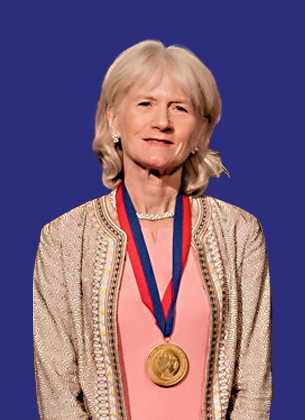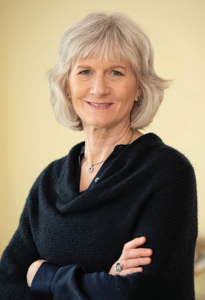
The prize citation for Dr. Sykes’ Barry Prize reads:
Elucidating basic immunology and carrying its discoveries to clinical application, Megan Sykes has advanced our ability to modulate the immune system in conditions ranging from blood cancers to Type I diabetes. Her breakthrough approach to immune tolerance causes a transplanted organ to be accepted by the recipient’s immune system as part of the self, thereby avoiding the need for immunosuppression with its potential for infections, cancers, and organ damage. The Academy honors Dr. Sykes’ distinguished contributions to excellence in medicine, improving humanity’s life-saving and life-changing capacity to regulate the human immune system.

Megan Sykes is Michael J. Friedlander Professor of Medicine, professor of microbiology and immunology, professor of surgical sciences, and director of the Columbia Center for Translational Immunology at Columbia University. She is also director of Research for the Transplant Initiative, and director of Bone Marrow Transplantation Research in the Division of Hematology/Oncology, at Columbia University Medical Center. She has received many honors and awards, including the Wyeth-Ayerst Young Investigator Award from the American Society of Transplant Physicians (1998), the AST Basic Science Established Investigator Award (2007), the TTS Roche Award for Outstanding Achievement in Transplantation Science (Basic) (2010), the TTS Award for Outstanding Achievement in Transplantation (Basic Science) (2014), and the 2018 Medawar Prize. She is a member of the Association of American Physicians, a Distinguished Fellow of the American Association of Immunologists, a Fellow of the American Association for the Advancement of Science, and an Honorary Member of IXA. She was inducted into the Institute of Medicine of the National Academies (now the National Academy of Medicine) in 2009. She has published more than 500 papers and chapters describing her work, and has been president of the International Xenotransplantation Association and of the Federation of Clinical Immunology Societies, and vice president of the Transplantation Society Council. Among many other accomplishments, her work on xenogeneic thymic transplantation for tolerance induction led, for the first time, to long-term kidney xenograft survival in non-human primates and is now being tested in pioneering human studies.
October 2024
The prize citation for Dr. Sykes’ Barry Prize reads:
Elucidating basic immunology and carrying its discoveries to clinical application, Megan Sykes has advanced our ability to modulate the immune system in conditions ranging from blood cancers to Type I diabetes. Her breakthrough approach to immune tolerance causes a transplanted organ to be accepted by the recipient’s immune system as part of the self, thereby avoiding the need for immunosuppression with its potential for infections, cancers, and organ damage. The Academy honors Dr. Sykes’ distinguished contributions to excellence in medicine, improving humanity’s life-saving and life-changing capacity to regulate the human immune system.

Megan Sykes is Michael J. Friedlander Professor of Medicine, professor of microbiology and immunology, professor of surgical sciences, and director of the Columbia Center for Translational Immunology at Columbia University. She is also director of Research for the Transplant Initiative, and director of Bone Marrow Transplantation Research in the Division of Hematology/Oncology, at Columbia University Medical Center. She has received many honors and awards, including the Wyeth-Ayerst Young Investigator Award from the American Society of Transplant Physicians (1998), the AST Basic Science Established Investigator Award (2007), the TTS Roche Award for Outstanding Achievement in Transplantation Science (Basic) (2010), the TTS Award for Outstanding Achievement in Transplantation (Basic Science) (2014), and the 2018 Medawar Prize. She is a member of the Association of American Physicians, a Distinguished Fellow of the American Association of Immunologists, a Fellow of the American Association for the Advancement of Science, and an Honorary Member of IXA. She was inducted into the Institute of Medicine of the National Academies (now the National Academy of Medicine) in 2009. She has published more than 500 papers and chapters describing her work, and has been president of the International Xenotransplantation Association and of the Federation of Clinical Immunology Societies, and vice president of the Transplantation Society Council. Among many other accomplishments, her work on xenogeneic thymic transplantation for tolerance induction led, for the first time, to long-term kidney xenograft survival in non-human primates and is now being tested in pioneering human studies.
October 2024
© 2023 American Academy of Sciences & Letters – Dover, DE
Site Designed by Mason Marketing